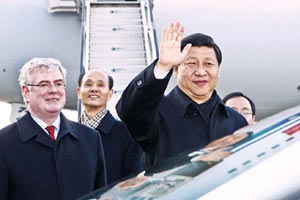Xi slated to sign flurry of deals in Europe
Updated: 2014-03-18 02:59
By Zhou Wa (China Daily)
|
|||||||||||
Visit expected to inject new energy into development of ties: ministry
President Xi Jinping is expected to sign several cooperative agreements in manufacturing, finance, energy and cultural exchanges in an upcoming tour of Europe that experts said will set a tone for future ties.
Xi will kick off his trip on Saturday and participate in the Nuclear Security Summit scheduled for March 24 and 25 at The Hague in the Netherlands, Vice-Foreign Minister Wang Chao said at a news conference on Monday. He is also expected to hold a meeting with US President Barack Obama on the sidelines of the summit.
Xi will be the first Chinese president to visit the Netherlands since the two countries established diplomatic ties in 1972.
 |
"China-Europe ties are developing smoothly in general ... This visit will inject new energy into the long-term stable development of China-Europe ties and will be a milestone for relations," Wang said.
Trade between China and the European Union reached $559 billion in 2013, according to Chinese statistics. The EU has been China's largest trade partner for 10 years, and China has been the second-largest trade partner of the 28-member bloc for 11 years.
In the Netherlands, Xi is expected to sign cooperative agreements in agriculture, energy, finance and culture and is slated to meet with King Willem-Alexander and Prime Minister Mark Rutte, Wang said.
In France, Xi will meet President Francois Hollande and Prime Minister Jean-Marc Ayrault and sign agreements to boost China-France cooperation in energy, aerospace, urbanization, agriculture and finance.
This year marks the 50th anniversary of the establishment of China-France diplomatic relations.
"Compared with other Western countries, Paris has always played a leading role in cooperating with Beijing in different phases of China's development," said Ding Chun, a professor of European studies at Fudan University in Shanghai.
"Paris' recognition of Beijing in 1964 not only shook up the order imposed by the US and the Soviet Union during the Cold War but was also a breakthrough in building a multipolar world," Ding said.
In Germany, Xi will meet German President Joachim Gauck and Chancellor Angela Merkel in Berlin, the first visit to Germany by a Chinese president in eight years. Xi is slated to sign a number of economic deals.
China and Germany "have kicked ties into high gear over the past decade", said Yang Xiepu, a researcher on German studies with the Chinese Academy of Social Sciences.
"In the framework of the China-Germany strategic partnership, economic cooperation will continue to be the cornerstone of Beijing-Berlin ties," Yang said in a report on China-EU relations recently released by the academy.
In Belgium, Xi will meet with King Philippe and Prime Minister Elio Di Rupo and sign agreements in trade, science and technology and education, Wang said.
Xi will also visit the EU's headquarters in Brussels to discuss the future of China-EU relations with President of the European Council Herman Van Rompuy, European Parliament President Martin Schulz and European Commission President Jose Manuel Barroso.
Japan's nuke stockpile
China urged Japan to respond to concerns from the international community over its "excessive" nuclear stockpiles, said Vice-Foreign Minister Li Baodong at the Monday news conference.
According to a January report from Japan's Kyodo News Agency, the United States gave 331 kg of weapons-grade plutonium to Japan during the Cold War. That amount, according to the report, could be used to produce 40 to 50 nuclear weapons.
At a Nuclear Security Summit in 2010, held in the US, Washington asked Tokyo to return the material. The issue is slated for discussion at The Hague.
Related Stories
Xi, Obama to hold talks 2014-03-17 13:59
Xi leads military reform, stresses strong army 2014-03-16 08:08
Xi leads military reform, stresses strong army 2014-03-16 07:44
Xi prepares for W. Europe visit 2014-03-15 08:01
Xi calls for closer ties with Saudi Arabia 2014-03-14 07:39
Xi meets Saudi Arabia crown prince in Beijing 2014-03-13 21:58
Today's Top News
Chinese authorities upgrade food waste fight
Xi slated to sign flurry of deals in Europe
Li vows not to give up plane hunt
Media workers sleep worst: report
US first lady's visit expected to boost goodwill
Putin recognizes Crimea
China simplifies immigration procedure
Twitter CEO makes first China visit
Hot Topics
Lunar probe , China growth forecasts, Emission rules get tougher, China seen through 'colored lens', International board,
Editor's Picks

|

|

|

|

|

|





